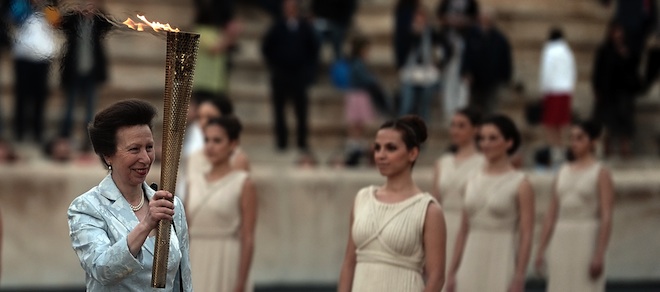The princess behind the Games
Anne, a former Olympic competitor, played a key role in lobbying for London as host
Princess Anne of Britain holds the torch with the Olympic Flame during the handover ceremony at the Athens’ all marble Panathenian stadium on May 17, 2012. AFP PHOTO / ARIS MESSINIS (Photo credit should read ARIS MESSINIS/AFP/GettyImages)
Share

When the London Olympics open on July 27, the world’s eyes will be focused on the athletes, the celebrities taking part in the opening ceremony and Queen Elizabeth II, who will officially open the 17-day event. Lost in that crowd will be the woman perhaps most responsible for getting the Games to the British capital. But Princess Anne seems to thrive in being upstaged, even if one of those people will be her own daughter Zara, a skilled horsewoman who completing for Britain in the three-day eventing challenge.
Anne, who was a European three-day champ in the 70s and who rode (and fell) for Britain at the 1976 Montreal Olympics, is known as the workhorse of the Windsor clan for maintaining a punishing schedule. In addition to her other duties, Anne, 61, is head of the British Olympic Committee and a member of the International Olympic Committee (IOC). Before London was selected in 2005, she played a key role in lobbying for London to fellow IOC members, something she’s never done in the past. She even got her mother, the Queen, to host an Olympic reception at Buckingham Palace.
In May, just before receiving the Olympic torch in Greece, Sebastian Coe, the former gold-medal sprinter who heads the London organizing committee, said, “Her commitment and passion for this is absolutely extraordinary.” When we have a board meeting at midday she has often opened two hospitals and a school by then.” British Olympic Minister Hugh Robertson concurred: “She is one of the great unsung heroes of this whole process. She played a key role in delivering the bid, she is president of the British Olympic Association, she sits on Seb’s board and she has 30 years experience of international sport. Because she is who she is she never asks for any thanks or praise, but she has played a remarkable role in this, and it is completely unheralded and largely unthanked.”
So it was typical that when Anne received the Olympic torch in Greece, she quickly handed it off to the über-photogenic David Beckham. Now, as the final countdown starts, she’s getting her due, though it’s more of a pat on a back than gushing prose. When the Washington Post recently ran an Associated Press article about Anne, its anaemic headline was “Princess Anne: not the flashiest, but when it comes to the Olympics, the princess has her fans.”After all, this is a woman who is famously rude to those who waste her time: Her favourite oath? “Naff off,” which is a variation of f–k off. And, she’s well into middle age, her harsh hair style hasn’t changed in decades, nor have her clothes, which are so endlessly recycled that the tabloids virtually celebrate when she looks well turned-out.
Still, for someone who’s been in the public eye since her birth, she sounds relieved that she doesn’t have to be an athlete today. “I would have found it really difficult to do it on a home patch—much easier to have done it elsewhere. I’d hate to be doing it now,” she said in an interview to BBC Sports. “All the things the electronic media have opened up, simply didn’t exist when I was doing it. Some people do find it a help, I am sure, but I suspect for others that’s a difficult level of intrusion to manage.”
But don’t mistake those concerns for fear. She’s not easily intimidated. For decades, she’s tramped through Third World villages as part of her three-decade long stint as president of Save the Children Fund. And in 1974, there was an attempt to kidnap her when a mentally ill Ian Ball ambushed her car outside Buckingham Palace in March 1974. Her bodyguard, another policeman, her driver and a passing journalist were all shot. As the BBC later recounted, “In a document written for prime minister Harold Wilson, the princess said the only thing that had stopped her from hitting Ball was the thought that he would shoot her.”
Given the massive security operation blanketing London, we hope that’s one thing Anne doesn’t have to worry about this summer.